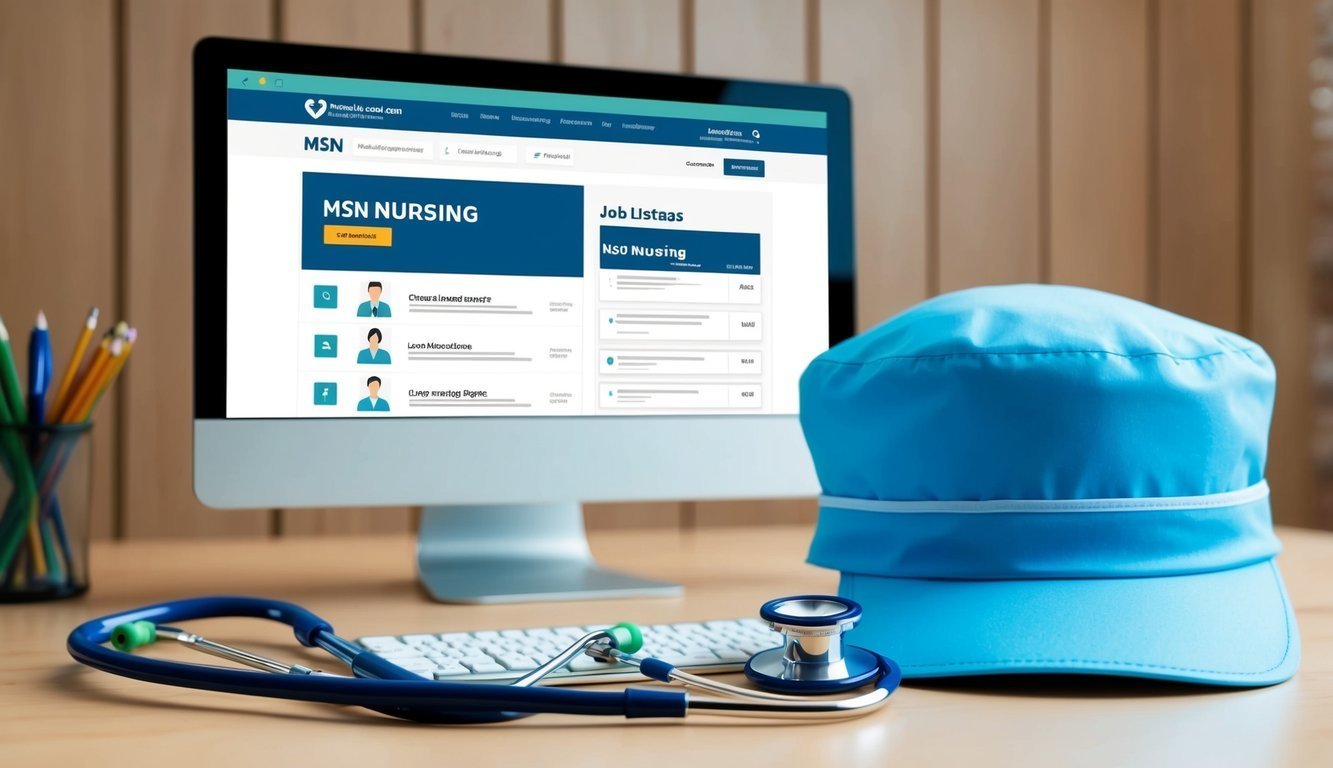The field of nursing offers many rewarding career options, especially for those with a Master of Science in Nursing (MSN) degree. Nurses with an MSN degree can take on various advanced nursing roles, such as nurse practitioner and clinical nurse specialist. These positions not only enhance your clinical skills, but also allow you to make a more significant impact on patient care.
With the growing demand for healthcare professionals, the outlook for MSN nursing jobs is promising.
Nurses who hold this advanced degree are well-equipped to take on leadership roles, improve health outcomes, and contribute to the evolving landscape of healthcare. As you explore your options, you may find a path that truly aligns with your interests and goals.
Regardless of whether you aspire to be a certified nurse midwife or a clinical nurse leader, the opportunities with an MSN are abundant.
Every role plays a vital part in delivering quality care and shaping the future of nursing.
Key Takeaways
- An MSN degree opens pathways to advanced nursing roles.
- The demand for MSN-educated nurses continues to grow.
- Each MSN role contributes significantly to patient care and healthcare leadership.
Overview of MSN Degree
The MSN degree opens doors to advanced nursing roles and offers specialized training.
This section covers how to obtain an MSN, the various specializations available, and the educational requirements for earning this degree.
Pathways to an MSN Degree
There are different pathways to earn your MSN degree.
The most common routes are through the BSN to MSN program and the RN to MSN program.
- BSN to MSN: This program is designed for those who hold a Bachelor of Science in Nursing. It typically requires 1-2 years of study, depending on the school.
- RN to MSN: For registered nurses (RNs) without a bachelor’s degree, this route allows you to earn both your BSN and MSN, often in a streamlined program.
Online MSN programs are also popular, allowing for flexible study arrangements.
Many accredited schools offer these pathways, ensuring quality education and proper credentialing.
Specializations in Nursing
Once you pursue an MSN, you can specialize in various fields.
Some popular MSN specializations include:
- Family Nurse Practitioner (FNP): Focuses on providing comprehensive healthcare to families and individuals.
- Adult-Gerontology Primary Care Nurse Practitioner: Specializes in care for adults, including older patients.
- Psychiatric Mental Health Nurse Practitioner: Concentrates on mental health care, diagnosis, and treatment.
Other options include roles like clinical nurse specialists and nurse informaticists.
Some MSN programs may also combine business and healthcare training, like the MSN/MBA or MSN/MHA.
Each program offers targeted curricula to prepare you for specific career paths.
Educational Requirements
To enroll in an MSN program, certain educational requirements must be met.
Typically, you should have:
- A Bachelor of Science in Nursing (BSN) or an equivalent degree.
- Current RN licensure.
- Clinical hours: Most programs require a certain number of clinical hours, which vary by specialization.
Tuition costs for MSN programs can differ widely based on the institution and format, with online programs sometimes offering lower rates.
It’s essential to find accredited schools that fit your budget and educational goals.
Some programs also offer financial aid opportunities to help with tuition costs.
Types of MSN Nursing Roles
As you explore roles available to MSN-prepared nurses, you will find opportunities in clinical practice, leadership, and education.
Each type of role has unique qualities and responsibilities that cater to different interests and strengths in the nursing field.
Clinical Roles
In clinical roles, you may work as an Advanced Practice Registered Nurse (APRN), which encompasses various specialties.
These include Nurse Practitioners, Certified Registered Nurse Anesthetists (CRNAs), Clinical Nurse Specialists (CNS), and Certified Nurse Midwives (CNMs).
- Nurse Practitioners (NPs) provide primary and specialty care, diagnosing and treating illnesses.
- CRNAs administer anesthesia and manage pain for patients during procedures, earning some of the highest salaries in nursing.
- CNSs focus on improving patient outcomes and may specialize in areas such as pediatrics or geriatrics.
- CNMs offer care to women during pregnancy and childbirth.
These roles require advanced clinical skills and often involve a degree of independence in practice.
Leadership and Administration
If you are drawn to leadership, roles such as Nurse Manager, Nurse Administrator, or Executive Nurse Leader might interest you.
- Nurse Managers oversee specific departments and coordinate nursing staff to ensure quality care.
- Nurse Administrators handle budgeting and policy-making, and may serve as the Director of Nursing.
- Executive Nurse Leaders focus on strategic planning and overall management of healthcare organizations.
These positions require strong leadership skills and often involve collaboration with other healthcare professionals to improve service delivery.
Educational and Informatics Roles
In education, you might consider becoming a Nurse Educator or working in Healthcare Informatics.
- Nurse Educators teach future nurses in academic settings or provide training in clinical environments, playing a vital role in addressing the nursing shortage.
- Informatics Nurses use information technology and systems to improve healthcare delivery. They work on projects that enhance patient care through technology, often engaging with electronic health records and data management.
These roles emphasize the importance of teaching and technology in modern nursing, highlighting critical areas for growth and development in the field.
MSN Career Outlook
The job market for MSN holders is robust, driven by increasing healthcare demands.
With the nursing shortage and a shift toward higher-skilled roles, this outlook presents many opportunities for career advancement.
Job Market and Demand
The job market for MSN-prepared nurses is expanding rapidly.
According to projections, more than half a million new registered nurse positions are expected by 2028.
This growth is partly due to an aging population and increased focus on healthcare services.
The healthcare industry is seeking advanced practice nurses like nurse practitioners (NPs), nurse anesthetists, and nurse midwives.
These roles often come with higher salaries, with average earnings around $125,900 for APRNs.
The demand for primary care providers is particularly strong, as many seek accessible care options.
Role Progression and Opportunities
Holding an MSN degree opens doors to various roles in both clinical and nonclinical settings.
Many nurses move into leadership or management positions, influencing healthcare policies.
For example, MSN graduates can work in public health, research, or education.
They play vital roles in shaping health policy and improving community health outcomes.
With nursing experience, you can significantly impact patient care and healthcare systems.
Consider exploring the best-paying MSN jobs to guide your career path.
The opportunities are vast, allowing for both personal fulfillment and professional growth.
MSN Clinical Competencies

Clinical competencies are essential for MSN graduates.
These skills ensure that you can provide high-quality patient care and make informed decisions in various healthcare settings.
Advanced Clinical Skills
As an MSN graduate, you will master advanced clinical skills that are crucial in diverse roles.
This includes performing diagnostic tests, interpreting results, and providing effective patient care.
You may work as an Acute Care Nurse Practitioner or a Family Nurse Practitioner, where you will assess patient needs and develop care plans.
Your training will prepare you to prescribe medications and manage complex health conditions.
Key advanced skills include:
- Conducting comprehensive physical assessments
- Administering treatments and medications safely
- Utilizing evidence-based practices in patient care
Familiarizing yourself with epidemiology will also enhance your ability to understand health trends and improve patient outcomes.
Critical Thinking and Decision Making
Critical thinking is vital in nursing, particularly for MSN professionals.
You must analyze complex information and make quick, accurate decisions that impact patient care.
In your role, you’ll be faced with challenging situations that require a solid understanding of medical concepts.
You will evaluate diagnostic tests and weigh options for treatment.
Developing a systematic approach to problem-solving will help you navigate these scenarios effectively.
Skills in critical thinking include:
- Assessing patient data critically
- Making evidence-based decisions
- Anticipating potential complications
These competencies prepare you to deliver safe, effective care while advocating for your patients’ best interests.
For more information on developing these skills, consider resources like Nurse.org.
Frequently Asked Questions
This section addresses common inquiries concerning MSN nursing jobs, including salary expectations, available roles, and the value of obtaining an MSN degree.
You may find the answers insightful for your career decisions.
What are the highest paying positions for MSN degree holders?
The highest paying positions for MSN degree holders typically include roles like Nurse Anesthetist, Nurse Practitioner, and Clinical Nurse Specialist.
According to the latest data, Nurse Anesthetists can earn an average annual salary of around $183,580.
What types of nursing roles are available for individuals with an MSN?
Individuals with an MSN can pursue various roles, including:
| Role | Description |
|---|---|
| Nurse Practitioner | Provides primary and specialized care. |
| Clinical Nurse Leader | Oversees nursing teams and patient care. |
| Nurse Educator | Teaches and trains nursing students. |
| Nurse Administrator | Manages healthcare services and departments. |
What career paths can one pursue with a Master’s degree in Nursing?
With an MSN, you can follow several career paths, such as Healthcare Administration, Nursing Education, and Advanced Practice Nursing.
Each pathway offers unique responsibilities and requires specific skills to succeed.
How does obtaining an MSN affect a nurse’s salary potential?
Obtaining an MSN can significantly increase your salary potential.
On average, nurses with an MSN earn up to 20% more than those with only a Bachelor of Science in Nursing (BSN).
This increase is often seen in leadership and advanced practice roles.
What are the remote job opportunities for MSN-educated nurses?
Remote job opportunities for MSN-educated nurses include roles like Telehealth Nurse and Clinical Consultant.
These positions allow for greater flexibility while still enabling you to contribute to patient care and health education.
Is pursuing an MSN degree a valuable investment for a nursing career?
Many people see pursuing an MSN degree as a valuable investment.
It can lead to higher salaries, more job opportunities, and the potential for advancement into leadership positions.
The commitment can pay off in various ways throughout your nursing career.

